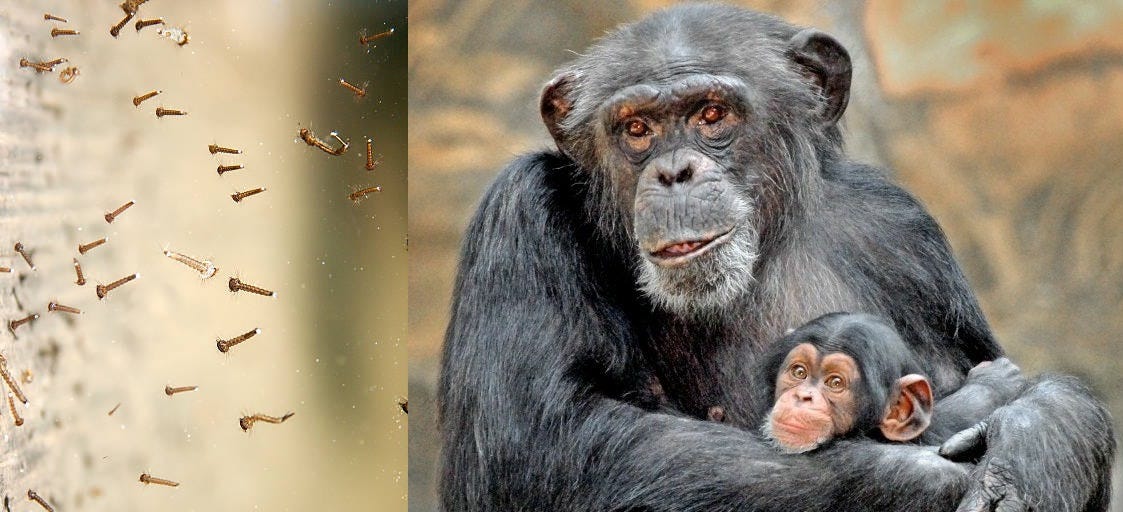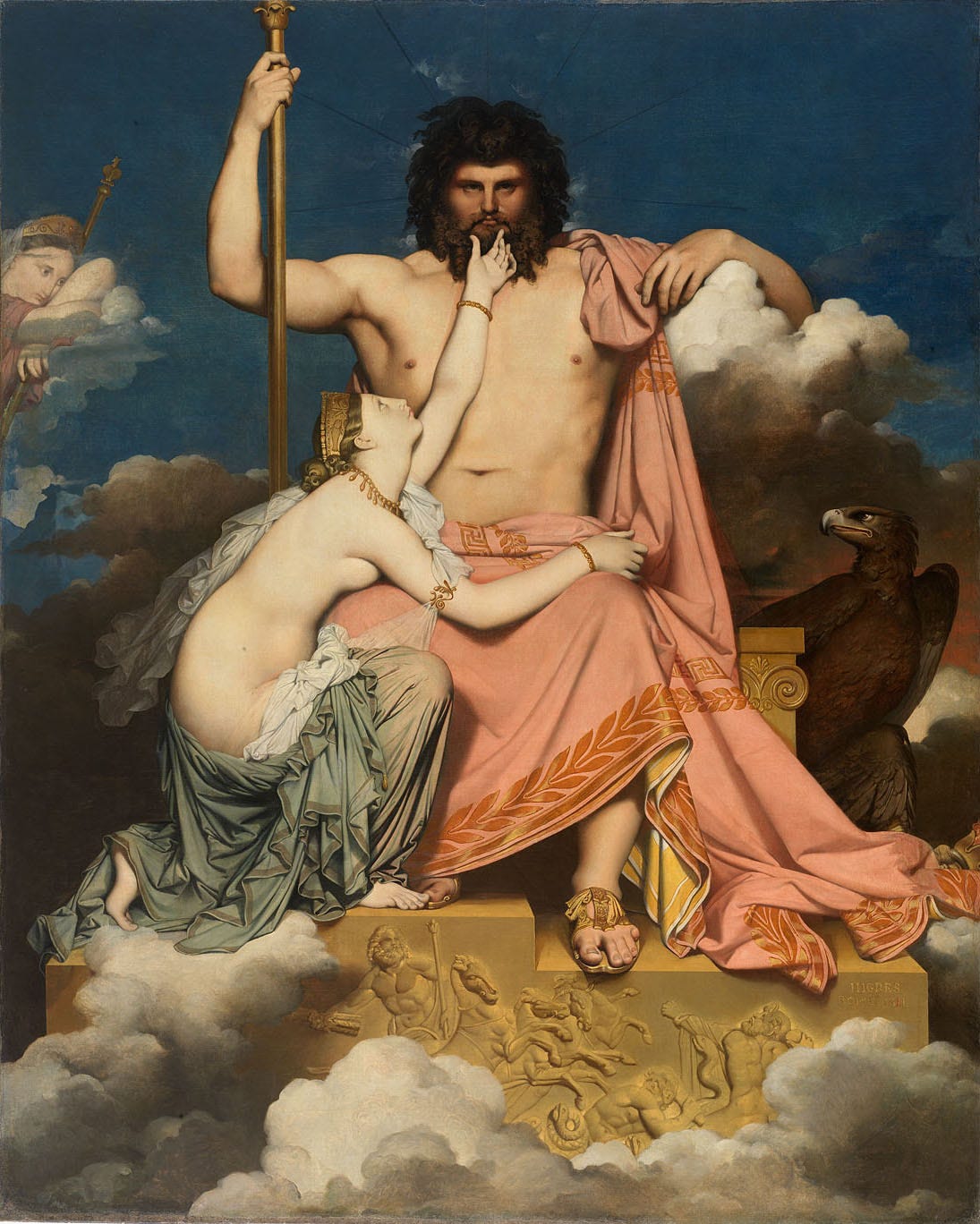Don't Talk to Machine Elves!
How memes and the internet expose the difference between angels and demons.
The most apparent trouble with the “religions” of the modern world — and by that I mean everything which has displaced religion, from atheism, to ideology to new age DMTism — is that they all evolved under conditions of abundance and instability.
One could reasonably ask why that would be a problem. To answer this question, we have to look at r/K selection theory, a framework in ecology which concerns how organisms in a given environment tend to propagate.
There are, ultimately, two types of environments: the stable and the unstable. In the former, energy is expensive, and in the latter, it’s cheap. That’s the difference.
If energy is cheap, the environment will be, of course, energetic and wildly variable. If it is expensive, it will tend to fall into a system of fixed, reliable patterns whose stability can be trusted.
Organisms which evolve in the unstable environments have r-selected reproductive strategies. What this means, in essence, is this: they don't care about their offspring, they just propagate as much as they can.
Organisms which evolve in the stable environments are K-selected. Where energy is costly, reproduction is costly. Therefore, these organisms make considerable efforts to ensure the success of a small number of children.
Good examples of r-selected organisms are rabbits, mosquitoes, cockroaches and frogs. Some K-selected organisms are elephants, polar bears and chimpanzees.
We’re talking here about evolution in unstable environments, so let’s look at those.
These environments are unpredictable. The probability that any particular child will die is high, and hard to reliably reduce. Their survival is thus, a numbers game, so these creatures invest most of their energy in making more children, making them quickly (before the parents themselves die) and making them often. This as opposed to making better children.
The debate about whether or not memes should be thought of as organisms is asinine, and I will not waste anyone’s time arguing that point here. Information is alive. Genetic information is simply one form of it. We should expect therefore, that memetic proliferation conforms to these basic laws. And as I’ve said already, it is very obvious what kind of environment these things are operating in today. They are in a highly unstable environment, feasting upon human attention, which is abundant and cheap, but increasingly fickle.
For this reason, the strategies they employ look like r-selected strategies. It isn’t biological because they aren’t either, but the pattern is the same.
These ideas, archetypal images, beliefs, etc. have been likened to viruses (as in “viral meme”) because the virus is the ultimate r-strategist. It is free-floating genetic material. While a cockroach or fruit fly invest disproportionate resources in propagation, the virus literally invests all of its resources in propagation.
Likewise, the one aim of these memes is to pollinate as many minds as possible as quickly as possible. To "get while the getting is good."
They have no long-term goals beyond this.
The memes of antiquity did not behave this way. It was not viable then. The environment was too harsh. The memes of the ancient world were K-selected. They had to improve the fitness of their hosts, or else the hosts died and the memes died with them.
This, to a much greater extent, resembles the K strategy: “Invest in the children.”
For the ancient meme, the well-being of the believer was as important as that of the belief, because the fitness of the believers was the fitness of the belief. If an idea ruined its believers, that idea could not endure.
It is noteworthy in this context, that the God of Christianity is a father. Specifically, a father who loves his children. That is as K-selected as you can get.
But even the pagans were strengthened in some way by their gods. The Olympians cannot rightly be called parasitic. The Olympian hierarchy must have been less parasitic than that of the Titans, or else they would never have prevailed. And that is precisely what the myths tell us, for Kronos, the Titan king, was a father who consumed his children.
The religions of the ancient world are not even the same kind of phenomenon as the ideas at large today. They share only the most basic structural-mechanical features. A spider and an ape both eat and reproduce, but that is where the similarities end. The ancient memes were adapted to an entirely different sort of world. A world where the oral traditions of the strong kept the fittest ideas alive, and let the novel nonsense burn away.
That is not the world of today. The world of today is a world of distraction; a world where novelty thrives at the expense of intelligence.
In the short-term, it is no longer necessary for gods to strengthen those who strengthen them. They are not bound in the same way to territory and blood, and the internet allows them to propagate farther, faster and easier than ever before.
A video for instance, which contains “infectious” content doesn’t have to do anything but hold a few hundred viewers’ attention. After that, as long as the algorithms of Google and YouTube remain operational, they will do almost all of the work.
Consequently, all the “substance” of our thoughts has atrophied. They no longer have to be wise, adaptive or otherwise improve human fitness. They just have to be contagious, and so that is all that they are.
It is only now that memes can become truly parasitic. Today's ideas are hyper-infectious mind viruses because that is what this environment favors. But the environment of the past almost exclusively favored symbiosis.
Those days do seem to be behind us for now. But here's the thing:
The strong, slow meme always does win in the end.
The blazing, glitzy “dopameme” inevitably burns out.
None of this ancient alien, machine elf, conspirituality stuff is going to endure. It will only thrive as long as there is comfort and decadence for it to thrive in. Imprudence and spiritual deficiency are the waters in which they swim. Just as a physical virus must exploit biological vulnerabilities, these must exploit psychological ones. The very presence of the “viral” is an indication of poor health.
This is an infestation. Psychic energy is cheap. Our minds have become “the whore of Babylon” who gives herself away indiscriminately, and the memes have adapted — they have evolved into STDs.
But a mind which cannot tell the difference between what is worthy of attention and what isn't — the kind vulnerable to infection — is a weak mind. Fill something weak with parasites and it becomes even weaker.
What then? Conquest? Shall such as these be the masters of Olympus? I think not.
Parasites lack wisdom. They lack foresight. They lack any kind of intelligence at all. They do not see the circles they walk in, nor the stony, waiting stare of Saturn. They in fact do not “see” at all. They lack true vision.
They just want and want and want. And in that alone they can be trusted.
They inevitably orchestrate their own destruction. They can be counted on to do it, and that is precisely what I am doing.
When the Aquarian winter comes, they will drop; quite literally, like flies.
That is, after all, what they are. Was Satan not called “Lord of the Flies?”
“Let die he who would die.
He who would live shall live against all odds.”










This is why I shop at the mall and listen to pop music and watch advertisements. Strengthen the old psychic immune system.
While I thoroughly agree that the present state of the average mind having been sucked into the perpetual cycle of artifice is nothing short of a fully manifested illness within post modern culture, and the term "viral" is rather appropriate to describe the phenomena of memeology. I cannot help but guard myself against the notion of "The most apparent trouble with the “religions” of the modern world — and by that I mean everything which has displaced religion, from atheism, to ideology to new age DMTism — is that they all evolved under conditions of abundance and instability."
While it's true that many spiritual prospectors seem to jump to whatever is new and hot, or perhaps one might even say viral... It would be short sighted to place all of these new ideas and concepts in bed with the virility often found constantly churning meme culture.
The Abrahamics as humanity knew them in the pre-industrialized age are dead. This has occurred because of their inherent unwillingness to adapt to what was clearly a transition between eras. What we are seeing now, in the form of new-age religions, is humanity's desperate attempt at reaching for something with some semblance of meaning, something that carries with it the sort of muse inspired art produced by the Greeks, the Sumerians, or any other era of renaissance. This is the dualistic reaction to the all too obvious age of artificial uselessness you described in meme culture.
Having cast off the shackles of our previously dogmatic and tyrannical systems of faith (e.g. Christianity), and with them the closed off medieval psyche, they seek out an existential meaning in something more adaptive, more robust to the times you might say. It is here where you begin to see people experimenting with psychedelics, meditations, modes of magick otherwise forbidden by the a priori oppressors of the pre-industrial age, or even humanism (often disguised as atheism) whereby their version of god is the abstracted faith of humanity prevailing. What all of these have in common is the inherent desire to reach to the heavens, and seek out knowledge and understanding of existence. Logos and Pathos. What will come out of all of this, will be something transmutable, digestible, individualized. For the connection one has with the divine is like no other individual relationship. Like fingerprints, the religious experience is a wholly individual thing, and cannot be reproduced between two different people. It is in this way that the virus of short term pop-culture dies, and in its place is the ascension of the individual psyche to a higher mode of understanding and fulfillment. Of course this will not happened for everyone all at once, and the world will always be filled with the moblike sheep, scampering about, looking for whatever gives them an immediate sense of satisfaction. These are the lost souls often depicted in the works of Heronymus Bosch, trapped in their own self made hells of all contentedness.
Ultimately I believe you and I to be on very similar pages on this topics, in that the art of the robust and higher thinking mind will survive this strange age of artifice, while the producers of your aforementioned banal and mundane memes will ultimately fall prey to the inherent nihilism that dwells at core of their heart.
The mobs may seem appeased, but the individual is thirsty, hungry, starving. Their mind in a state of famine. They will begin, and many already have begun seeking out something deeper, something greater, something filling.